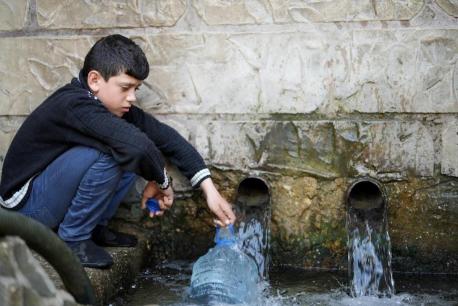
Children's Futures Are On the Line in Lebanon
A year after the deadly Beirut explosion, humanitarian needs in the country remain critical due to an escalating economic crisis, COVID-19, failing water systems and other hardships on families.
On Aug. 4, 2020, when a chemical cache ignited in Beirut's port district — tearing through the central part of the city, killing more than 200 people (six of them children), injuring 6,500 (1,000 of them children) and displacing 300,000 (including 100,000 children) — Lebanon was already in crisis. Economic collapse, food insecurity and a surge in COVID-19 cases had left children and families across the country in need of emergency assistance.
One year after the explosion, children in Lebanon continue to bear the brunt of a devastating recession, the coronavirus pandemic and the lingering effects of the deadly blast.
Lebanon, one year after a deadly blast, remains mired in multiple crises
Faced with major inflation and rising unemployment, families are finding it increasingly difficult to cover their basic needs. More than half the population is living in poverty. Water systems are at risk of failing. Children are going to bed hungry, their health, education and futures increasingly at risk.
Widespread poverty means more children are working instead of going to school
"More and more families are being forced to resort to negative coping measures, including sending their children to work in often dangerous and hazardous conditions, marrying off their young daughters or selling their belongings," UNICEF's representative in Lebanon, Yukie Mokuo, said in a recent statement calling for more donor support to fund UNICEF's response.

Hadi, 15, picks fruit for five hours a day to help support his family in Ismaeie, southern Lebanon. More and more Lebanese are facing multiple vulnerabilities due to the COVID-19 pandemic, the tragedy of the Beirut explosions and an escalating economic and social crisis. © UNICEF2021/Kassem-Dabaji/Lebanon
Instead of attending school, Hadi, 15, spends five hours a day picking fruit in Ismaeie, southern Lebanon, to supplement the family's meager income. Mousa (name changed), a Syrian refugee who is also 15, makes about $3 a day cleaning windshields at a busy intersection in Saida to support his father who is too sick to work.
While the 1.5 million Syrian refugees living in the country are the hardest hit, more and more Lebanese are in need of assistance. UNICEF is on the ground working with local partners to provide critical water, sanitation and hygiene (WASH) support, education, child protection and treatment for malnutrition. A UNICEF-backed cash grant program — a follow-up to the emergency cash assistance given to families affected by the 2020 blast — aims to reach 70,000 children in need.

"I come with my dad every day to help him collect water for my family," says Syrine, 10, as she juggles two large and newly refilled plastic bottles near her home in Wadi El Jamous, Lebanon. © UNICEF/UN0492500/Choufany
UNICEF is also providing mental health support and psychosocial first aid to children who are engaged in child labor, those who have experienced or are at risk of violence and those still suffering the trauma of last summer's port disaster.
One of many urgent tasks for UNICEF and partners: preventing the collapse of Lebanon's water systems
In the first three months of 2021, UNICEF spent $6.9 million on repairs and maintenance to shore up critical public water systems, but more help is urgently needed to keep those systems operational, Mokuo said. UNICEF works closely with public providers to ensure services continue to reach the most vulnerable children and women in Lebanon.
If the public water supply system collapses, UNICEF estimates that water costs could triple as families are forced to get their water from private water suppliers. For far too many households, this cost will be too much to bear.

A UNICEF WASH team member monitors a water truck delivery in Iaat, north Lebanon, with WASH partner LOST on April 22, 2021. © UNICEF/UN0492487/Sanchez
UNICEF's humanitarian action plan for Lebanon builds on the WASH and other interventions that were launched in the immediate aftermath of the Beirut port explosion and have already reached tens of thousands of children. COVID-19 prevention and response remains a major focus for teams on the ground.
“Determined, concerted action is critical to mitigate the suffering, particularly among the most vulnerable, who are trapped in a spiral of poverty,” Mokuo said. “Children’s well-being and safeguard must be a top priority."

Hanan, 8, participates in a UNICEF psychosocial support program at the Karantina public garden in Beirut that was set up for children affected by last summer's port disaster. © UNICEF/2020/Choufany
Help UNICEF save and protect vulnerable children and families in Lebanon. Your contribution can make a difference. Donate today.
Top photo: In Wadi El Jamous, Lebanon, 11-year-old Adham rides his bike to fetch water for his family from the village well, pedaling home with the two containers hanging from the handlebars. "Four times a day I make this journey," he says. "I come, whatever the weather. Sometimes in summer the well dries up, and we go days without water." © UNICEF/UN0492502/Choufany
HOW TO HELP
There are many ways to make a difference
War, famine, poverty, natural disasters — threats to the world's children keep coming. But UNICEF won't stop working to keep children healthy and safe.
UNICEF works in over 190 countries and territories — more places than any other children's organization. UNICEF has the world's largest humanitarian warehouse and, when disaster strikes, can get supplies almost anywhere within 72 hours. Constantly innovating, always advocating for a better world for children, UNICEF works to ensure that every child can grow up healthy, educated, protected and respected.
Would you like to help give all children the opportunity to reach their full potential? There are many ways to get involved.





